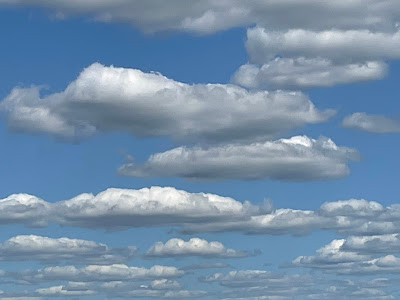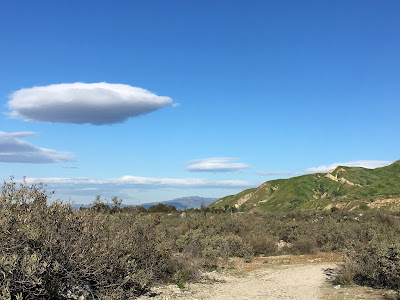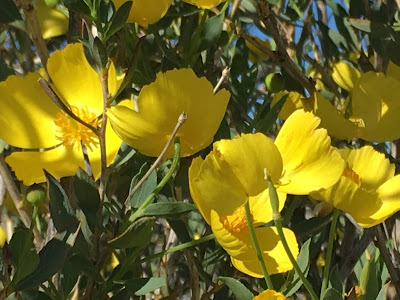California Quarterly Vol. 49, No. 4, Winter 2023. Cover Art: Popocatepetl, Spirited Morning—Mexico by Marsden Hartley (1877-1943). Oil on board, 25x29 in. Smithsonian American Art Museum, Gift of Sam Rose and Julie Walters, 1932
I recently had the pleasure of editing the California Quarterly, Volume 49, Number 4, Winter 2023, and selecting work by 42 poets. I found 58 poems that fit on the allotted pages of the journal and selected a classic American painting by Marsden Hartley for the cover. The full table of contents is posted on CaliforniaStatePoetrySociety.com blog:
https://www.californiastatepoetrysociety.com/2023/11/contents-of-california-quarterly-vol-49.html
In my list of publications the majority of books are edited, I like reading work by others and juxtaposing their insights into a rich tapestry of voices, a counterpoint of humanity as it were. I could write more by myself, but seldom have the motivation to do so. Among my music history books, only three were written entirely by me: my doctoral dissertation on space in music, a study of Polish Folk Dance in California (by Columbia University Press) and a history of the Modjeska Club that I preside upon and that recently celebrated its 50th anniversary. The rest are collected or co-authored volumes.
Among my poetry books also there are quite a few anthologies with contributions by up to 90+ poets. The most recent book, Crystal Fire. Poems of Joy and Wisdom, had 12 contributors. It is nice to put the insights by different people side by side to see the threads that join their work, and note the differences. When working with poems for anthologies I ask for more submissions than could be published and select what I like the best. The choice is simple: I like it or I do not like it. It is not a value judgment of the quality of the poem or the poet. It is my own taste that comes into play.
If I like too many poems by one poet, I try to publish more than one, or select what fits what the emergent, overall theme of the issue. In the Winter 2023 issue of the California Quarterly the obvious theme of winter, snow, cold, farewells, was juxtaposed with the theme of rain, because there were so many "rain" poems among the submissions. So in my editor's note, reprinted below, I start from a quote from a "rain" poem by Leopold Staff that also imitates the regular pattern of raindrops in its rhythm.
In English, the most common Greek meters are iamb (short-long), trochee (long-short), dactyl (long-short-short) and anapest (short-short-long). In Polish with its preferred penultimate-syllable accent, the most common is amphibrach (short-long-short), with a name that means "short-on-both-sides." Leopold Staff uses this meter throughout his "rain" poem - and its repetitiveness serves as an illustration of the noise of the rain in a beautiful example of onomatopoeia, but also captures the endless dreariness and melancholy of loneliness. I'm often alone but very seldom lonely, so to me it is a very distant poem. I do not cite it as a whole... In the reprinted note below, I marked up the accents that align themselves into a regular pattern, repeating throughout.
Popocatepetl, Spirited Morning—Mexico by Marsden Hartley (1877-1943). Oil on board, 25x29 in. Smithsonian American Art Museum, Gift of Sam Rose and Julie Walters, 1932
EDITOR'S NOTE
“O szyby deszcz dzwoni,
deszcz dzwoni jesienny
I pluszcze jednaki,
miarowy niezmienny...”
(Leopold Staff, Deszcz Jesienny)
In Leopold Staff’s poem I memorized at school, the onomatopoeia of “sh” and “ch” sounds (“sz” and “cz” in Polish) illustrates the sound of rain. I do not know how to translate it into English while keeping the sound, the rhythm, and the meaning intact. It is difficult to make transition from one language to the next…
Why do we love or hate rain? There are several rain poems in this issue—by serendipity, perhaps. In northern countries, when drizzle falls too often from gray, overcast skies, rain is associated with melancholy, sorrow, and depression (O’Sullivan, Sapp, and Beynon). It became a stereotype. Just think of Disney movies, when the heroine starts to cry…
In hot, desert countries, rain brings with it blessings of food, life, and love (Rosenheim, Skaldetvind, Stuart). What about snow, then? A blessing or a curse, depending on how much snow falls, for how long. Under the northern lights, it is a view to behold (Luisi). In Chinese movies snowflakes caught in lovers’ hands signify the abundance of affection. In northern countries, we have the “White Christmas” – though the event giving rise to this holiday took place in the desert, under a palm tree.
What matters is the celebration of “now” – as in the poem by W.C. Gosnell, or The Night Heron by Jennifer M Phillips: “Open your fist. There is nothing to grasp.” Phillip Jason wisely advises the reader that all experiences are meant to “turn you into good.” Yes, we should cherish our days “without thorns” (Jane Stuart), when stars blink in Morse Code that “nothing is over” (Zanelli) and angels make “you sing / And sing and sing / Like a joyful child.”
During winter holidays, whether skiing, cooking, or wrapping gifts, we become like children, engrossed in the moment, watching a blue balloon, “rising into a sky” (Machan). If we cannot let go of sorrow, we may find solace in dreams (Hitt, Fraley), or prayer (Silberstein, DiOrio). Per Quantum Entanglement (Hammerschick), we are all One, anyway…
In addition to poems that moved me, this issue presents the winners of the 36th Annual Poetry Contest. It is clear that the taste of the Contest Judge, Anna Maria Mickiewicz, is markedly different from mine. This diversity is a gift to be cherished.
Maja Trochimczyk California Quarterly
Los Angeles, California Volume 49, Number 4
Marsden Hartley, Yliaster (Paracelsus), 1932, oil on paperboard mounted on particleboard, 25 1⁄4 x 28 1⁄2 in. (64.1 x 72.4 cm.), Smithsonian American Art Museum, Museum purchase made possible by the Smithsonian Institution Collections Acquisition Program and by George Frederick Watts and Mrs. James Lowndes, 1988.53
Just like Leopold Staff, Jane Stuart looked out the window and saw a rainy landscape, slowly turning into one of snow, I like poems that capture the moment, the lyrical "now" in few words evoking an image that carries in it its own emotion.OUTSIDE, TONIGHT
A cold evening rain—
wind-soaked shadows, purple pine
clumps of clinging moss
...invisible wind
warmed by sparkles of sunlight,
cooled by winter's rain
A soft fallen snow
drifting over evergreen
floating through the night
~ Jane Stuart, Flatwoods, Kentucky
My own poem, written specifically for the California Quarterly, was inspired by a photograph I saw somewhere of a snow lotus, that looked quite bizarre and otherworldly to me, so I wondered if it would be worth my time to travel to the Himalayas to see these rare blossoms with my own eyes. In a stream of consciousness, I then thought about traveling to all the other countries, and being faithful just to one, or two, and of course back to the flowering meadows of my childhood and the inevitable skylark above. This is what the engineers of our fate want to deprive us of, the wide open spaces of fertile fields, the peaceful meadows, life in the countryside.
A garden filled with birdsong is a great substitute for a childhood meadow, so I love my life in California. Why should I travel then? If all I love is right there? When the plandemic started and injections became mandatory I decided I'd rather not go anywhere ever again. It was my own choice so I did not travel for quite a while, I can drive around LA, go to the ocean, go to a concert, and I tend to leave my phone at home, with humorous conversations with my car, yes car, that puts messages on its screen telling me to not forget my phone, and frantically trying to connect to other phones it detects nearby... So funny. The car that talks. So weird. The car that keeps track of what I do and what I carry with me. Welcome to the dystopia of electronic leashes, smart 15-minute cities, and totalitarian control.
White, like starfish skeletons
deep in the ocean, snow lotus blooms
in a barren Himalayan valley.
Do I have to touch its smooth petals
to live my life to the full? Do I have to
learn 200 anthems of 200 nations,
celebrate their independence 200 times?
Countries I'd never visit, even in my dreams.
It is good enough to learn just one valiant
anthem, a “call to arms” mazurka—or maybe
two—in my case of abandoned childhood
meadows, sprinkled with stokrotki daisies,
maki, chabry i rumianki—I was lured away
by exotic beauty, the bright bougainvillea,
with her myriad butterfly eyes. Too late I saw—
though different, it was still the same.
I sing a new anthem among strangers
at a concert—words flicker in darkness
on the screen of my phone—I am supposed
to take it everywhere with me—my car said so,
and keeps looking for it, when I go out
without my electronic leash. So, I'll leave
alone cold, limp petals of the snow lotus,
bewilderingly alien on its gravel plane.
I'll dream of watching clouds float by—
scoops of meringue in the pristine blue,
pierced by skylark's song cascading
onto fields of May-green barley. There is
no reason to go anywhere but inwards—
on the one journey into the silent glow
of stokrotki meadows within my heart.
~ Maja Trochimczyk, Los Angeles, California
"Stokrotki" are small white daisies scattered over Polish lawn and meadows; white with gold center, they are lovely, and make the grass more interesting; white clover does the same, but stokrotki are prettier. "Maki, chabry, i rumanki" - poppies, cornflower, and chamomile daisies are three common field flowers from Polish countryside, often depicted together as an unofficial symbol of the Polish nation in red, blue and white. Are they prettier than the rare and exquisite snow lotus? Depends who's looking...
PETITION
Morning comes and,
with it, headlines
blaring hate and carnage
and suffering and sadness
and depravity and duplicity
and defeat.
Turn off the TV.
Put down the paper.
Walk outside.
Give yourself up
to fresh air and sunlight,
to butterflies and birdsong,
to growing things and
grazing things and
hope.
Rise above,
be lifted up,
inhale
and hold on,
hold on.
Jayne Jaudon Ferrer
Greenville, South Carolina
.jpg)




































